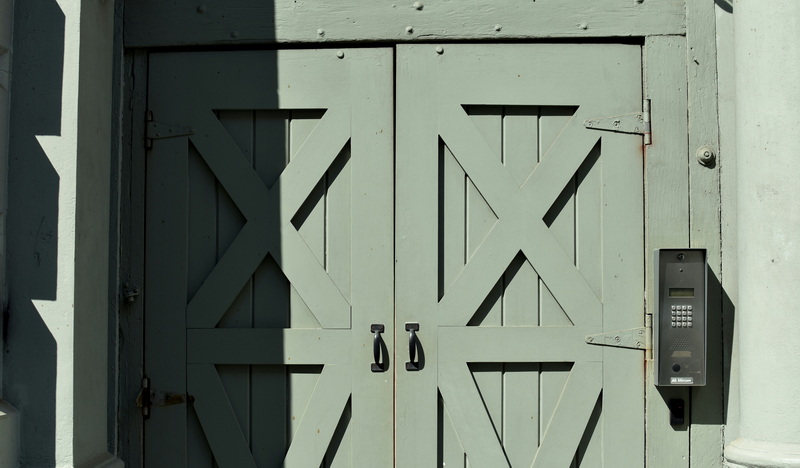English 




Views: 222 Author: Astin Publish Time: 2025-03-25 Origin: Site



Content Menu
● Introduction to Aluminum Adjustable Door Bottom Weatherstrips
>> Benefits of Aluminum Adjustable Door Bottom Weatherstrips
>> Steps to Install the Aluminum Adjustable Door Bottom Weatherstrip
● Common Types of Door Bottom Weatherstrips
● Troubleshooting Common Issues
● Choosing the Right Weatherstrip for Your Door
● Additional Tips for Installation
● FAQ
>> 1. What tools do I need to install an aluminum adjustable door bottom weatherstrip?
>> 2. How do I adjust the weatherstrip for uneven thresholds?
>> 3. Can I use aluminum adjustable door bottom weatherstrips on metal doors?
>> 4. How often should I replace my door bottom weatherstrip?
>> 5. Are aluminum adjustable door bottom weatherstrips suitable for all types of doors?
Installing an aluminum adjustable door bottom weatherstrip is a straightforward process that can significantly improve the energy efficiency of your home by sealing gaps between the door and the threshold. This guide will walk you through the steps to install this type of weatherstrip effectively.

Aluminum adjustable door bottom weatherstrips are designed to provide a flexible seal that can be adjusted to fit different door and threshold configurations. They typically consist of an aluminum extrusion with a vinyl or rubber insert that contacts the threshold, creating a tight seal. These weatherstrips are particularly useful for doors with uneven thresholds or those that require frequent adjustments due to seasonal changes.
- Energy Efficiency: By sealing gaps, these weatherstrips help reduce heat loss in winter and heat gain in summer, leading to lower energy bills.
- Pest Control: They prevent insects and rodents from entering through gaps under the door.
- Moisture Protection: They help keep rain and snow from entering the home, reducing the risk of water damage.
- Noise Reduction: By sealing gaps, they can also help reduce noise from outside, creating a quieter indoor environment.
Before installing the aluminum adjustable door bottom weatherstrip, ensure you have the following materials and tools:
- Aluminum Adjustable Door Bottom Weatherstrip: Choose a product that matches your door width and has adjustable features suitable for your threshold.
- Screws: Typically provided with the weatherstrip, but ensure they are compatible with your door material.
- Drill or Screwdriver: For screwing the weatherstrip onto the door.
- Tape Measure: To measure the door width accurately.
- Utility Knife or Hacksaw: For cutting the weatherstrip to size if necessary.
- Pencil or Marker: For marking screw positions.
- Safety Glasses and Gloves: For protecting yourself during the installation process.
1. Measure the Door Width: Use a tape measure to determine the width of your door. This will help you cut the weatherstrip to the correct length if it is not pre-cut.
2. Clean the Door Bottom: Remove any dirt, dust, or old weatherstripping residue from the bottom of the door to ensure a clean installation surface. Use a damp cloth or a gentle cleaning solution if necessary.
3. Cut the Weatherstrip (If Necessary): If your weatherstrip is not pre-cut to size, use a utility knife for vinyl parts or a hacksaw for aluminum parts to trim it to the correct length. Leave a slight overlap at the ends for a secure fit.
4. Mark Screw Positions: Use a pencil to mark where the screws will go. Typically, screws are spaced evenly along the length of the weatherstrip.
5. Attach the Weatherstrip: Place the weatherstrip along the bottom of the door, aligning it with your marks. Use screws to secure it in place. Start with the center screw and work your way outward to ensure even pressure.
6. Adjust the Weatherstrip: Once installed, adjust the weatherstrip to ensure it makes good contact with the threshold. This may involve tightening or loosening screws or adjusting the vinyl insert.

Besides aluminum adjustable types, there are other common door bottom weatherstrips:
- Finned Sweeps: These are attached to the bottom of the door and feature fins that contact the threshold. They are effective for even gaps.
- Kerf Cut Seals: These require a kerf (groove) cut into the bottom of the door and are very effective but more difficult to install.
- Staple-On Sweeps: These are attached using staples and are often used on older doors.
- Automatic Door Bottoms: These are spring-loaded and automatically adjust to seal gaps when the door closes.
- Gaps at the Edges: If there are gaps at the edges after installation, consider adding additional weatherstripping or adjusting the existing strip.
- Difficulty Adjusting: Ensure screws are not overtightened, as this can make adjustment difficult.
- Weatherstrip Not Sealing Properly: Check if the threshold is uneven or if the weatherstrip is damaged. Adjust or replace as necessary.
Regular maintenance can extend the life of your door bottom weatherstrip:
- Inspect Regularly: Check for signs of wear or damage, such as cracks or tears.
- Clean Regularly: Use a damp cloth to wipe away dirt and debris.
- Replace When Necessary: If the weatherstrip no longer provides a tight seal, it's time to replace it.
When selecting a door bottom weatherstrip, consider the following factors:
- Door Material: Ensure the weatherstrip is compatible with your door material (e.g., wood, metal, fiberglass).
- Threshold Type: Consider whether your threshold is even or uneven, as this affects the type of weatherstrip needed.
- Climate: In areas with extreme weather conditions, choose weatherstrips designed for durability and resistance to moisture.
- Use Safety Equipment: Always wear safety glasses and gloves when working with tools.
- Follow Manufacturer Instructions: Check the manufacturer's instructions for specific installation recommendations.
- Test the Seal: After installation, test the seal by closing the door and checking for gaps.
Installing an aluminum adjustable door bottom weatherstrip is a simple DIY project that can significantly improve your home's energy efficiency and reduce pest entry. By following the steps outlined above and choosing the right type of weatherstrip for your door, you can enjoy a tighter seal and lower energy bills.

- You will need a tape measure, utility knife or hacksaw, pencil or marker, drill or screwdriver, and possibly metal screws if your door is metal.
- Adjust the screws or the vinyl insert to ensure good contact with the threshold. You may need to tighten or loosen screws to achieve the best seal.
- Yes, but ensure you use metal-compatible screws to secure the weatherstrip.
- Replace your weatherstrip when it shows signs of wear or no longer provides a tight seal. This is typically every few years depending on usage.
- They are suitable for most doors but may not be ideal for doors with very uneven thresholds or those requiring a kerf cut. Always check compatibility before purchasing.
[1] https://www.youtube.com/watch?v=B0VU0t4cAOA
[2] https://www.thisoldhouse.com/doors/21019297/quick-and-easy-weathersealing
[3] https://www.allaboutdoors.com/Article-Replacing-and-Installing-Door-Sweeps-Bottoms
[4] https://www.youtube.com/watch?v=q6q_70hEl2g
[5] https://www.youtube.com/watch?v=K1WRRT-h_zs
[6] https://www.youtube.com/watch?v=MsAnT2M7u3M
[7] https://www.frostking.com/products/door-sweeps-door-bottoms-door-thresholds/adjustable-aluminum-and-oak-sill-threshold
[8] https://www.youtube.com/watch?v=6d1RGCvA9kk
[9] https://raven.com.au/professional/automatic-door-bottom-seals/rp92si
[10] https://www.youtube.com/watch?v=NOdts_pu3Zs
Top Aluminum Furnitures Manufacturers and Suppliers in Czech Republic
Top Aluminum Furnitures Manufacturers and Suppliers in Poland
Top Aluminum Furnitures Manufacturers and Suppliers in Belgium
Top Aluminum Furnitures Manufacturers and Suppliers in Finland
Top Aluminum Furnitures Manufacturers and Suppliers in Denmark
Top Aluminum Furnitures Manufacturers and Suppliers in Greece
Top Aluminum Furnitures Manufacturers and Suppliers in Portugal
Top Aluminum Furnitures Manufacturers and Suppliers in Austria
Top Aluminum Furnitures Manufacturers and Suppliers in Norway
Top Aluminum Furnitures Manufacturers and Suppliers in Sweden
